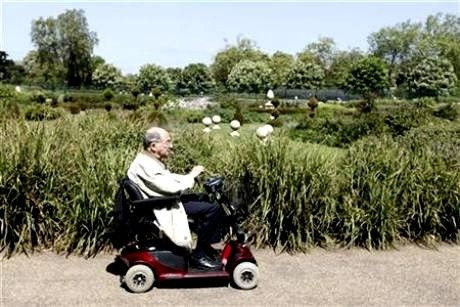Australian Sex Worker for Disabled People Draws Praise

An Australian sex worker who specializes in disabled clients has sparked praise from around the world.
A documentary about her, titled “Scarlet Road: A Sex Worker’s Journey,” aired on Australian Channel SBS One on Friday.
It featured sex worker Rachel Wotton and her disabled clients John Blades and Mark Manitta.
Blades was diagnosed with Multiple Sclerosis 26 years ago. This condition eventually confined him to a chin-controlled wheelchair. The official website of Scarlet Road claims that ongoing sexual sessions with Wotton allowed Blades to regain some previously lost body movements.
Blades, formerly a civil engineer and more recently a documentary filmmaker, died on Nov. 25 at the age of 51.
Manitta, who has Cerebral Palsy, is also confined to a wheelchair and speaks through a voice machine. He has been a client of Wotton’s for the last seven years.
“People do not understand the difference that sex makes,'' said Manitta through his voice machine on the Scarlet Road program, reported the Sydney Morning Herald.
''People assume disabled people don't have the same biological needs and desires that everyone else has. But sexual expression is a basic need for everyone, not just for those who can walk and talk freely,” said Wotton.
Wotton's business of sex-for-pay, however, is illegal in most parts of the world. In some parts of the world where it is legal, activities associated it with -- like soliciting and pimping -- are not. Only in a few countries is it practically legal and regulated.
Moreover, society at large -- especially in countries with traditional values -- has mixed (if not negative) views on prostitution in general.
Anna Bowden of Eaves, a London-based charity that supports vulnerable women, does not agree that disabled men should resort to female prostitutes.
While Bowden acknowledged that disabled men have “a very difficult situation,” she does not think “the answer is perpetuating a form of violence against women,” reported BBC in a 2007 article.
I don't think everybody has the right to sex with another person,” said counseling psychologist Simon Parritt.
In 2010, a minor uproar was sparked by a Daily Mail article claiming that a 21-year-old man with learning disabilities was flown to Amsterdam to have sex with a prostitute on taxpayer money. Contrary to Parritt’s view, the social worker for the 21-year-old man claimed sex was a “human right.”
The 2007 BBC article reported that an online survey in 2005 showed 62.5 percent of disabled men and 19.2 percent of disabled women said they would use trained sex workers.
For Wotton and the documentary “Scarlet Road,” the response so far has been overwhelmingly positive.
“#ScarletRoad was amazing, insightful, thought-provoking. Above all- COMPASSIONATE. Something so often missing in #sexwork,” tweeted Catherine Reidy of Australia.
“This is pretty awesome. It's really depressing to think that? those with 'disabilities' are, by much of society, defined as asexual. Glad to see work's being done to reverse that notion,” wrote a YouTube commenter.
A Sydney Morning Herald article called the documentary a “touching tale” and its encounters “liberating” and “unexpectedly romantic.”
Below is the trailer for “Scarlet Road.”
© Copyright IBTimes 2024. All rights reserved.





















